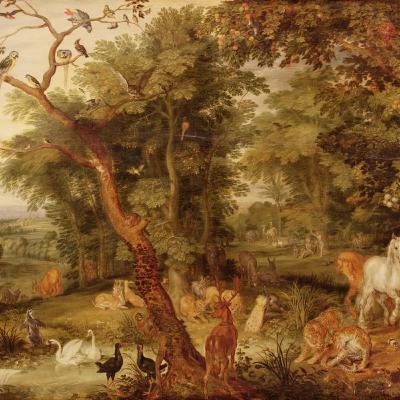Discover Kol BeRamah: The Daily Tanach Podcast
Kol BeRamah: The Daily Tanach Podcast

Kol BeRamah: The Daily Tanach Podcast
Author: Congregation Ramath Orah
Subscribed: 0Played: 0Subscribe
Share
© Congregation Ramath Orah
Description
Welcome to Kol BeRamah, the daily Tanach podcast from Congregation Ramath Orah in New York City. Together we join the global 929 project, learning one chapter of the Hebrew Bible each day, with reflections from Rabbi Yoni Zolty and members of the community.
8 Episodes
Reverse
Why did God destroy the world in Noah's flood only to recreate what appears to be an identical world with the same flawed humanity? This episode explores the profound but often overlooked transformation between the pre-flood and post-flood worlds.Far from elevating humanity, the flood narrative reveals that humans were actually demoted from their original status. Where Adam was granted royal dominion over creation, Noah's descendants must rely on fear and intimidation to control animals. The divine image (tzelem elokim) shifts from humanity's crown of distinction to a protective shield against murder.Yet this apparent demotion creates an unexpected opportunity. While Adam was a passive recipient of God's creation, Noah becomes an active partner—building the ark, sending out birds, offering sacrifices, and replanting the world. Humanity lost its automatic crown but gained the chance to earn it back through voluntary partnership with the divine.This paradigm shift from obligation to opportunity explains how God can promise never to destroy the world again while acknowledging that human nature remains unchanged. The world's fate is no longer tied to humanity's perfection, creating space for gradual moral development and the possibility of rising above our base nature—not because we must, but because we can.
Today’s chapter of the Flood story highlights the repetitions and contradictions that biblical critics have long discussed. We explore three main approaches: the academic “source text” theory, the harmonizing view that sees no real contradiction, and a literary-theological approach (following R. Mordechai Breuer) that views the dual accounts as two complementary perspectives. In one, God is transcendent, working through the order of nature; in the other, God is immanent and personal, saving Noah out of relationship. The Torah interweaves both to offer a fuller vision of God’s role in the world.
This enigmatic chapter opens with the “sons of God” and “daughters of men,” a mysterious union that has puzzled commentators for centuries. Rather than focusing only on their identity, we explore the narrative’s deeper message: the rise of the mighty Nephilim, the danger of glorifying physical strength over spiritual integrity, and God’s response of limiting human life to 120 years. Unlike other ancient traditions, the Torah frames mortality not as punishment but as a divine gift — a reminder of life’s urgency and the path to true greatness through righteousness, embodied by Noah.
Lineage of Shet and comparison to Kayin
Bereishit Chapter 4 recounts the story of Kayin and Hevel, the first murder in human history. This episode explores the striking literary parallels between this story and the Garden of Eden narrative in Chapter 3—shared structures of interrogation, evasion, curse, exile, and divine compassion. These connections reveal deep theological insights: the unity of moral and religious sin, the biblical pattern of exile following corruption, and the resilience of humanity to create and innovate even after punishment.
In this episode we revisit the expulsion from Gan Eden and ask: was it purely punishment, or part of humanity’s destiny? Drawing on insights from contemporary scholars, we explore the story as a metaphor for adolescence and the transition to adulthood. Adam and Eve’s “sin” lies less in seeking knowledge than in how they handled it—through blame and denial that ruptured their relationship with God. The expulsion thus reflects both natural growth into responsibility and the pain of broken trust. Ultimately, the narrative affirms humanity’s dignity and purpose: to labor, create, and partner with God in shaping the world.
In this first episode of the 929 Tanach Project, Rabbi Yoni Zolty explores the structure and patterns of Bereshit chapter 1. The creation story unfolds in symmetry—days 1–3 forming the world’s framework, and days 4–6 filling it with life. Rabbi Zolty highlights the equal creation of man and woman, humanity’s shared dependence with animals, and the Torah’s striking silence on whether humans are inherently “good,” leaving free will as the central question of Bereshit.
In this episode, Rabbi Yoni Zolty explores the apparent contradictions between Bereshit chapters 1 and 2. While chapter 1 presents creation from a universal, ordered perspective, chapter 2 re-centers the narrative on humanity, highlighting man’s central role in naming, cultivating, and partnering with God. Rabbi Zolty compares classical approaches—from Rashi’s klal u’prat to modern readings by Rav Soloveitchik and others—and shows how chapter 2 reframes the story of Gan Eden. Far from being only a tale of expulsion, the text suggests that humanity’s true purpose is realized when returning to work the land outside the garden.
Comments
 United States
United States




